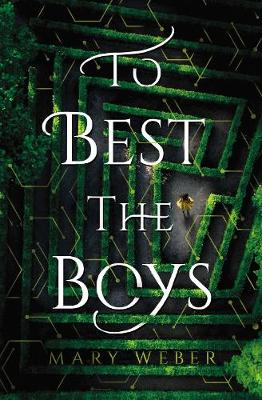
Kat @ Novels & Waffles
Although To Best the Boys by Mary Weber isn't a perfect literary specimen by any means, it is an empowering book that works hard to subvert harmful gender expectations and their accompanying stereotypes.
WHAT I LIKED:
💭 The Concept! Basically, I would describe this book as The Maze Runner meets The Hunger Games with the feminism dial turned all the way on high. In order to win a chance at attending the prestigious male-only Stemwick University, our main character channels some of her inner Mulan by sawing off her hair in the dead of night and donning a pair of trousers (which she got off a dead body, might I add. This girl's hardcore). I love the "Heroine Disguises Herself as a Boy" trope, so I was instantly snagged by the premise!
💪 The Themes! Undoubtedly, the best part of this book is that it sends one big FLYING KICK-A-POW to the patriarchy's tender parts. It revolves around Rhen, a scientist-in-training who spends the majority of her free time in the company of diseased lab rats and exploding cadavers. Contrary to what her society expects of women, she isn't content with ending up as a romantic footnote in some boy's life story. She wants to be the star of her own.
This book offers up a powerful narrative about the struggles women face every day to make themselves heard in a world that's trained to only hear and value a man's voice. It also touches on other hard-hitting topics such as the importance of having varied and diverse representation in politics, as well as the unfair nature of class stratification.
"For the girl who’s been told to quiet down, calm down, sit down, or just leave it to the men—this is for you. And to those who told you such things? Watch. Us. Rise."
👥 The Supporting Cast! Behind every great mind, there’s even greater friends, and Rhen proves no different. Although Rhen is an intelligent and empowering heroine, the two characters that really caught my attention were Seleni and Beryll.
Seleni is Rhen's upperclass girly-girl cousin who wholeheartedly looks forward to the day she'll get the chance to become both a wife and a mother. Her determination and boundless love prove that courage, and even feminism, don’t fit just one mold.
"I’ve always wanted the life of a wife, and mother, and helpmate to my husband, and I know you may not think much of that, but it’s what I want. And I’d be proud of it. Same as I’ll be proud of whatever you do...And I think that desire is just as noble as what you’re doing, if that’s the life I want and choose."
Beryll is Seleni's beau, and he's a soft-spoken, weak-stomached cinnamon roll who spends half the book being appalled at one conceived impropriety or another. His quiet strength and polite respect for all those he meets serves to deconstruct the toxic masculinity we so often see depicted in media today.
WHAT I LIKED...LESS:
🗺️ The Worldbuilding! The story takes place in a fictional province called Caldon, which is located in the middle of "a much larger collection of kingdoms commonly referred to as the Empyral Lands." If you're hoping to dive deeper than that, then you'd better switch out your scuba gear for a snorkeling mask, because we’re swimming in shallow waters today, folks.
As if that wasn't enough, fantastical creatures, such as sirens, ghouls, and basilisks, are haphazardly tossed into the story alongside some weaksauce mentions of magic. This adds nothing to the narrative and only managed to distract me from both its tone and overarching message. If anything, the inclusion of such magical elements feels like a lazy way to explain away the mystery of the Labyrinth and its creator, Mr. Holm.
✏️The Plot! Contrary to what the book blurb might have you think, this isn't a fast-paced, survival-of-the-fittest sort of story, though it does have its moments. Instead, To Best The Boys takes its molasses-sweet time introducing characters and their motivations, with the promised deadly maze competition not starting until about halfway through. Additionally, many questions such as, "Who is Holm? What's with the Labyrinth? How does it all work?" are never answered in any significantly satisfying way. The true heart of this book lies in its powerful message about women, and it doesn’t feel the need to flesh out much of anything else besides that.


